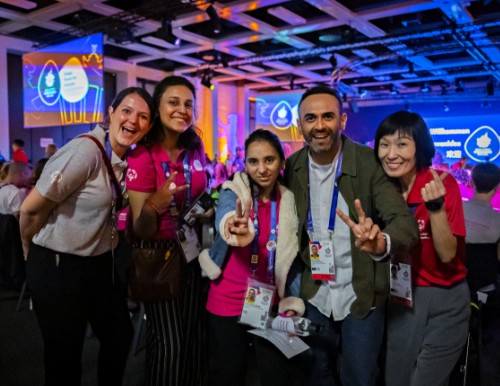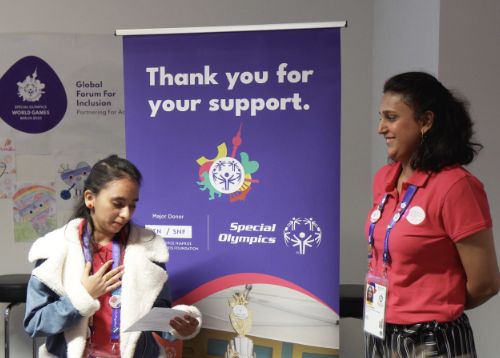“Even special children have the same feelings. We’re great people and we’re very friendly. We just want to be friends with others,” says athlete leader, Humaira Kazim who has intellectual disabilities.
What makes us different from one another? Is it in the clothes we wear, the cultures we come from, or our accents? No two people are ever the same, we are all unique with distinct quirks and differences. But the one thing we do have in common is being human.
In a world that is often divisive, appreciating differences and fostering empathy and compassion may sometimes seem more of an anomaly than the norm.
Thankfully, its stories like the heartwarming friendship between Yumna Masood and Humaira Kazim that illustrate how friendship can trump differences. Though they may seem like two young girls united by their shared love for sports, their unique bond goes far deeper than what meets the eye. Humaira, a remarkable individual with intellectual disability, finds not just a friend in Yumna but a unified partner (individuals without intellectual disabilities that play sport alongside athletes that have intellectual disabilities), mentor, and guide, all wrapped into one incredible friendship.

The two sportswomen earlier represented Pakistan at the Global Youth Leadership Summit in Berlin amidst the backdrop of the World Games. “I have seen so many people represent Pakistan and I am so proud to be a part of this,” said Yumna of the experience.
Despite the pandemic, the duo’s friendship continued to strengthen, guided by mutual respect and reciprocity. Explained Yumna, “In 2020 and 2021, due to Covid, we couldn’t meet each other. So, we would always be on Zoom calls whenever we had projects to work on. If we had to collaborate, we would get on a call. I talk and she listens. Then she would talk, and I would listen.”
In a distraction-filled world, the duo’s friendship underscores the importance of giving someone undivided attention and active listening. Yumna said, “we tend to talk over people, especially special children, some of which have verbal challenges.” She urges society to embrace differences with respect and acceptance, “I would urge people to have the patience to accept special children. They are really amazing people, if you get to know them. They are beautiful people,” she continued.

Humaira and Yumna’s journey challenges prevailing misconceptions surrounding people with Intellectual Disabilities. It shines a spotlight on the unique skills, potential, and qualities inherent in each person. Their story encourages us to look beyond stereotypes and see individuals as the dream chasers that they are.
It reminds us that inclusivity is within reach, requiring just one person with a different perspective, willing to take that extra step to extend a helping hand.
What’s next for the two?
Yumna’s goal is to ultimately be a role model, a beacon of inspiration. “They already call me a youth leader, but I think there is more to it. It’s a long way to go,” she said.
Humaira adds, “I want to spread awareness in my country about people with intellectual disabilities. Inclusion in society is very important. I want to be a good example for children with intellectual disabilities.”
Humaira and Yumna are doing their bit for a better tomorrow. It’s time we too, play our part.
To know more, follow @humanraceasia and @soasiapacific.











